Applications belong to a service-oriented digital environment that requires rapid and seamless development. This results in the rising popularity of DevOps (Development Operations), where agile and lean methodologies are integrated into each step of the software development lifecycle.
Unsurprisingly, DevOps engineers are highly sought out. Each software company needs them to smoothen the pipeline and solve all the issues to ensure fast and stable delivery.
DevOps has become very lucrative as a career skill because of this demand. According to Glassdoor, those with DevOps skills in the US make $107,134 per year, while elite engineers earn much higher.
If you are looking for a solid career in the IT industry, DevOps is unarguably one of the best career paths available.
However, before landing DevOps jobs, you will have to possess all the required knowledge. This is not too troublesome as you can start by taking high-quality DevOps online courses.
This article will then assist you in selecting the right DevOps course that matches your preferences so that you can kickstart your journey right away without spending hours on a tedious course search.
Affiliate Disclosure: This article from Victory Tale contains affiliate links. We will receive a small commission from our partners if you purchase courses from them.
Nevertheless, we always value integrity and prioritize our audience’s interests. You can rest assured that we will present each DevOps course truthfully.
Things You Should Know
Prerequisites
DevOps is an advanced skill. Undoubtedly, it is not for absolute beginners. Before enrolling in any DevOps course on the list, you should possess the following knowledge:
- Intermediate Programming – Each course will have different needs, but most prefer JavaScript or Python. You should be able to write your own code and understand those written by others
- Linux Command Line/Bash Script
- Basic cloud computing concepts
Note: You do not need to have prior knowledge of cloud platforms (AWS, Azure, etc.). This is because all instructors will go through all this stuff in the courses.
Criteria
Below are the criteria for the best DevOps courses:
Udacity
The following two Nanodegree programs from Udacity are unarguably the best options if you want to learn DevOps with AWS or Azure. Because of their comprehensive curriculum, project-oriented approach, and timely support, very few online courses can match Udacity’s.
1. Become a Cloud DevOps Engineer (AWS)
Note: You should have a solid background in web development (HTML, CSS, and JavaScript) before enrolling in the first program.
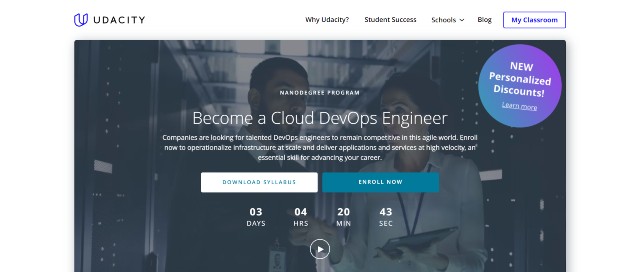
Course Content
This course consists of four minor courses as follows:
1. Cloud Foundations – The first course will introduce you to fundamental cloud computing concepts and explore all services provided by Amazon Web Services (AWS).
Such services include computing (EC2, VPC, Lambda), storage (S3, CloudFront, DynamoDB, etc.), security (IAM), networking (Route 53, EC2 Auto Scaling, etc.), and containment. Also, you will learn how to manage the cloud platform effectively through AWS management tools.
2. Deploy Infrastructure as Code (IAC) – This second course will guide you through the process of deploying infrastructure as code using CloudFormation.
Specifically, you will convert business requirements into infrastructure diagrams, implement a VPN and provide internet access to subnets inside VPCs. Later, you will deploy a web server and perform tasks to increase capacity and strengthen the security of your app.
3. Build CI/CD Pipelines, Monitoring & Logging – In essence, this course will detail all the complicated processes of deploying the software. First, you will use Ansible for configuration management and build proper CI/CD pipelines to smoothen deployment by using Jenkins.
Subsequently, you will use several AWS tools to perform monitoring and logging tasks. Hence, you will be alerted in case any technical issue flares up.
4. Microservices at Scale using Kubernetes – The final course will explain how to create and deploy a Kubernetes cluster. You will also perform containerization with Docker, operationalize microservices, and configure autoscaling.
Each minor course has tons of additional educational resources, such as quizzes, assignments, and, most importantly, a real-world project. Thus, you will complete as many as five projects upon program completion (including one capstone project).
Based on my observations, these projects are challenging, but the difficulty increases step by step, which is beneficial to your learning.
Once you complete them all, you will have sufficient hands-on experience and become job-ready for any entry-level DevOps engineer position. You can also add these projects to your Github portfolio to showcase your skills.
Since this program is self-paced, there is no obligation on when you need to complete the course. You can take as much time as you need. However, you need to pay more subscription fees if you spend more time on the course.
According to Udacity, the suggested pace is 10 hours per week for four months, but in reality, some students spend far more hours per week on the coursework. I thus recommend double-checking your schedule to ensure that you are free enough to manage the workload. Otherwise, you may need to pay hefty course fees.
Student Support
What differentiates Udacity from other online courses is its timely, multi-level support as follows:
Technical Mentor Support – Suppose you get stuck on coding assignments or encounter technical issues. You can use the chat interface on Student Hub to ask the mentors at any time (24/7/365),
Most students receive a reply within an hour. Hence, you do not need to wait for days or weeks like other online courses.
Project Reviews – Udacity has assigned a team of experienced experts to assist you in completing projects. Upon request, these experts will review your work, provide personalized feedback and guidance, and inform you about tips, techniques, and best practices. In some cases, they may even provide you with supplementary readings to help you improve.
The best part is that you can have unlimited project reviews, so you can send such requests at any time without waiting for your projects to reach specific milestones. This will create a feedback loop that benefits your learning.
Generally speaking, with this support, you will have extra learning channels apart from the lectures, resembling software/web development bootcamps.
Career Services – After completing the program, you can request the career services team to review your resume, LinkedIn profile, and Github portfolio. You can then rest assured that all properly showcase your skills, which can be highly beneficial for securing high-paying DevOps jobs.
Pricing
Udacity uses a subscription-based pricing model. As of September 2023, the platform has just revamped its pricing plans. Currently, you can subscribe to an all-access plan at $249 monthly (20% off if you choose the annual option.)
This plan will provide full access to Udacity’s exceptional tech-based curriculum, which includes this very course, the Azure course I list below, and other skills, such as data analytics or machine learning.
Furthermore, if you are a new student, you can create an account and apply for personalized discounts (like I did below).

This offer can be as high as 40%. You can subscribe to the annual plan, which costs only $120 per month for the program.
Pros & Cons
Pros
- Taught by a team of four veteran software developers
- Unarguably one of the best AWS DevOps training
- Comprehensive, industry-oriented curriculum
- Self-paced learning
- Include five challenging real-world projects for students to complete to gain hands-on experience and strengthen their skills
- Timely mentor support
- Unlimited project reviews from experts
- Career services are a big plus.
- Flexible pricing + Huge discounts for new students
Cons
- Costlier than other alternatives
- Demand strong commitment from students
- No free auditing or free trial
2. Cloud DevOps using Microsoft Azure
Created in collaboration with Microsoft, the second Nanodegree program will guide you through the entire process of developing and deploying applications on Azure.
Upon completion, you will be ready to take the AZ-400, a DevOps certification exam from Microsoft.
Note: This program requires you to have the following skills before enrolling:
- Python programming (at least intermediate level)
- Linux Shell (Bash Script, Command Line)
- Basic cloud computing skills (in the context of any major provider)
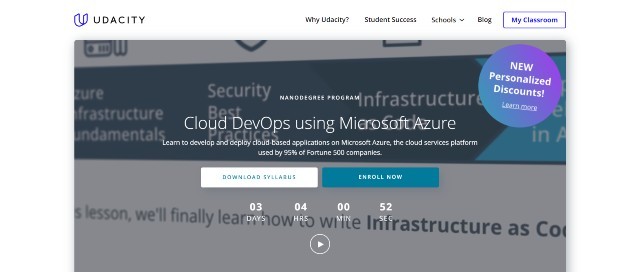
Course Content
This program consists of three minor courses as follows:
1. Azure Infrastructure Operations – The first course will drill deep into the DevOps lifecycle and infrastructure management on the Azure Cloud Platform.
In the second part of the course, you will use Azure DevOps tools to manage security risks and policies and deploy infrastructure as code.
2. Agile Development with Azure – The second course will cover the fundamental concepts of Agile project management and how to implement them with Azure.
Subsequently, you will learn about continuous integration (CI) and continuous delivery (CD) and build pipelines to streamline application deployment.
3. Quality Assurance – The final course will discuss the testing and monitoring aspects of the DevOps lifecycle. You will use various tools (including the CI/CD pipeline, Selenium, and Postman) to perform automated tasks.
Later, you will create alerts using Azure Monitor and ingest a custom log file utilizing Azure Log Analytics.
Each minor course has tons of learning resources, particularly real-world projects. For instance, you will deploy a web server on Azure and build a full-fledged CI/CD pipeline.
The workload of this program is lighter and more manageable than its AWS counterpart. You should expect to spend 5-10 hours per week on coursework to complete the program in three months.
Student Support & Pricing
Students enrolled in this course will have access to the same student support as the AWS program.
The price tag and all discounts are also the same. Once you subscribe, you can access both without paying additional fees.
Pros & Cons
Pros
- Created in collaboration with Microsoft
- Taught by a team of an experienced DevOps engineer, a software developer, and a university professor
- Informative video lessons
- Include three challenging real-world projects for students to obtain hands-on experience
- Upon completion, students will be ready to take the AZ-400 certification exam
- Timely mentor support + Unlimited project reviews
- Free access to career services
Cons
- Costlier than other alternatives
- No free auditing or free trial
3. DevOps on AWS Specialization
Offered by AWS itself, this Coursera specialization is unarguably one of the best options to learn DevOps on AWS. You will learn about DevOps methodologies and grasp how to use key AWS services to ensure fast and stable delivery.
Note: There are no specific prerequisites for this program.

Course Content
The specialization comprises four minor courses as follows:
1. AWS Cloud Technical Essentials – The first course will go over various cloud services on the AWS platform. Subsequently, you will learn about AWS’s shared responsibility model and Identity and Access Management (IAM)
2. Code, Build, and Test – The second course will introduce you to DevOps tools and practices that you can implement to optimize your organization’s ability to deliver fast and stable applications and services.
Also, you will incorporate testing into the CI/CD pipeline and use DevOps tools to conduct application tests and automate the release process.
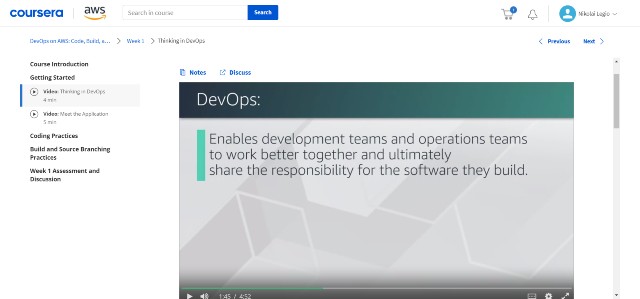
3. Release and Deploy – The third course will be about application deployment. You will grasp how DevOps principles and methodologies can improve the deployment process and which tools can be beneficial in streamlining it.
For example, you will learn about Infrastructure as Code (IaC) and how enterprises can use them to achieve automation.
4. Operate and Monitor – The final course will guide you on using AWS solutions in management tasks, including monitoring, continuous compliance, and optimization of resource utilization.
Throughout the program, you will get hands-on with various AWS services, allowing you to be comfortable using them in your work life.
Compared to Udacity’s programs, this specialization requires a much lower weekly commitment. AWS recommends spending only three hours per week for three months.
The reason is that this program will not cover advanced topics or have challenging projects like Udacity’s. Udacity’s nanodegree program is still a far better choice if you want to develop career-ready skills.
You can audit every course for free. However, because this program has several hands-on assignments, opting for a full course experience is a better idea.
Currently, you can choose between a subscription ($49 monthly) and a one-time payment (basically, paying subscription fees upfront for 3-6 months). I suggest the latter because you can get up to 50% discounts on course fees.
Pros & Cons
Pros
- Taught by a team of three senior cloud technologists at AWS
- Beginner-friendly: Best for students who want to test the waters
- Include short but helpful readings
- Offer several lab sessions for students to get hands-on
- Flexible enrollment methods
- Free auditing
Cons
- Do not delve into advanced topics + Students believe more case scenarios should be added.
- Some students encountered a few technical issues in the exercises
4. Dooey’s DevOps Certification Training Course
Suppose you are looking for a project-based course that focuses on DevOps tools. In this case, you should consider this training course from Dooey.
You will learn to utilize prominent DevOps tools such as Jenkins, Cucumber, and Ansible to perform CI/CD tasks, automate configuration management, etc.
Note: You should have a robust foundation of Linux, web development, and Java before taking the course.
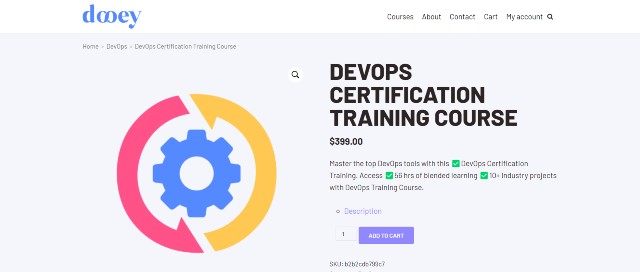
Course Content & Pricing
Below is a summary of topics that you will learn from this course.
- Introduction to DevOps – DevOps tools, Best practices, Agile-DevOps relationship. etc.
- Version Control Systems – Roles & types of control systems, Git, Supporting tools
- CI & CD and Build Tools – Key concepts, Jenkins, Team City, Maven
- Testing Frameworks – Approaches & automation tools, JUnit 5, Cucumber
- Configuration Management Tools – Ansible, Puppet, Chef, Saltstack
- Containerization with Docker – Virtualization, MySQL Database in a container, Registry, Networking, etc.
- Continuous Monitoring – Types of monitoring systems, Nagios, Grafana, ELK Stack
- Cloud Computing – Cloud Services, AWS, Kubernetes
The course has more than 20 hours of video content in 8 lessons. The most fascinating of all is the learning resources that accompany it.
Each lesson has demos, short assignments, key takeaways, and a real-world project. Furthermore, there are four additional real-world projects for students to work on after completing the curriculum.
In total, there are as many as 12 projects in this course. Hence, you do not need to look for DevOps projects elsewhere once enrolled since you already have all you need for practice.
Regarding pricing, this course costs $399 one-time.
Pros & Cons
Pros
- Unarguably one of the best online courses for DevOps tools
- Well-structured curriculum
- Provide 24 demos of popular DevOps tools and other helpful learning resources
- Include 12 industry-based projects for students to apply the knowledge they have learned
- Self-paced learning
Cons
- Inflexible pricing
- No free auditing or free trial
5. Introduction to DevOps: Practices and Tools
This edX program from the Linux Foundation provides insights into prominent DevOps tools, allowing learners to seamlessly incorporate DevOps into their software development processes and thrive as DevOps engineers.
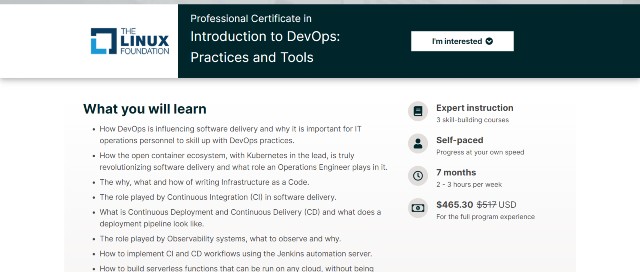
Course Content
The program consists of three minor courses as follows:
1. Introduction to DevOps and Site Reliability Engineering – The first course will drill deep into DevOps principles and practices, including CI/CD, open container ecosystem, IaC, and site reliability.
2. Introduction to Jenkins – The second course will guide you through CI/CD fundamentals and discuss how CI/CD transforms the software delivery process.
Next, the course will introduce you to Jenkins. You will learn to use it as a CI/CD tool. Specifically, you will install the server, build the software, manage third-party integrations, and perform scaling and securing tasks.
3. Introduction to Serverless on Kubernetes – The final course will focus on building serverless functions that can run freely without limitations on any cloud platforms.
Note: Some sections of Course 2 and Course 3 have no videos. You will learn only from text-based lessons and illustrations.
Based on my observations, the lessons are of high quality. They are easy to follow. However, many (including me) find this approach boring. I highly suggest auditing the course before enrolling.
Auditing all the courses is free, while the verified track costs $79 monthly.
Pros & Cons
Pros
- High-quality text-based lessons + Clear explanations of concepts
- Straightforward curriculum
- Self-paced learning
- Free auditing
Cons
- No videos for some sections on Course 2 and 3: Many students find text-based lessons boring.
6. DevOps Beginners to Advanced | Decoding DevOps with Projects
If you are looking for affordable DevOps training, this course from Imran Teti is undoubtedly one of the best options. Imran is a skilled instructor with more than ten years of experience. Learning with him will help you kickstart your DevOps career most smoothly.
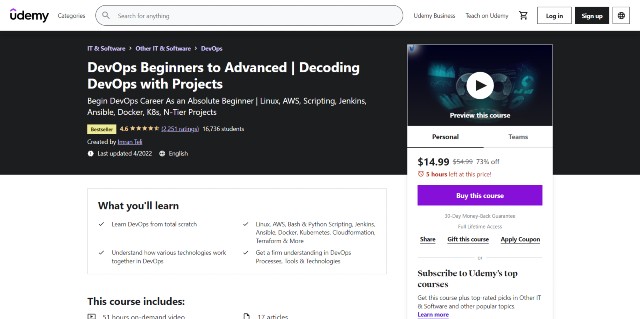
Course Content
The course is gigantic. It consists of more than 51 hours of video content, encompassing the following topics:
- Introduction to DevOps and CI & CD + Setup
- Linux & Networking Reviews
- Introduction to Containers & Bash Scripting
- Deep dive into AWS – EC2, EBS, ELB, Cloudwatch, EFS, R3, and RDS
- Re-architecting web applications
- Git & Maven
- Continuous Integration with Jenkins, Nexus, Sonarqube, and Slack
- Python Review
- Deep dive into Ansible
- Continuous Delivery and Configuration Management using Jenkins and Ansible
- Deep dive into AWS Virtual Private Cloud (VPC)
- Docker & Kubernetes
- Deploying apps on Kubernetes Cluster
- Terraform and Cloudformation
- and many more
All video lessons are pretty informative. The instructor explains all the processes step-by-step. Unfortunately, many of them are not bite-sized. They can be up to 40 minutes in length, which is optimal if you get stuck and want to review the concepts.
Reviews: 4.6/5.0, Students: 16580+
Pros & Cons
Pros
- Taught by an experienced instructor
- Comprehensive curriculum put together in a logical manner
- Informative, in-depth lessons
- Lifetime Access + 30-day money-back guarantee
- Inexpensive ($20 or lower when on sale)
Cons
- Some lessons are not bite-sized.
- Based on the reviews, some sections are less clear than others
- The instructor has a strong accent. Some students found it difficult to understand him completely and wanted subtitles.
7. DevOps Fundamentals – CI/CD with AWS +Docker+Ansible+Jenkins
Are you looking for a crash course for DevOps with AWS? If so, this Udemy course from Rahul Shetty is probably one of the best available. Throughout 9 hours of video content, you will learn the entire process of automating CI/CD using multiple DevOps tools on AWS.
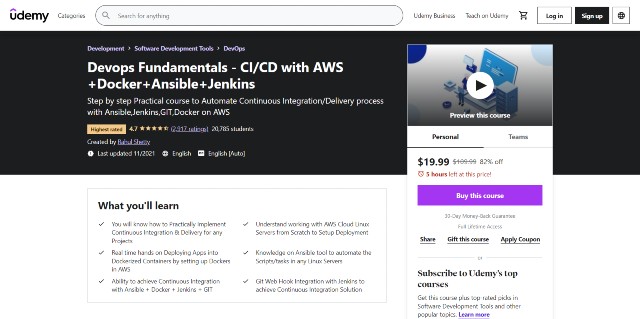
Course Content
The structure of this course is project-based. You will follow the instructor in performing multiple DevOps tasks. The following are the topics that you will learn from this 9-hour course.
- Introduction to DevOps
- CI/CD Roadmap + Deployment Basics
- Setup AWS account + Launch Linux servers and connect SSH client to them
- Linux commands and Java Maven Setup
- Jenkins Plugins
- Docker + App Deployment into Containers
- Ansible
- Build a CI Solution with Git WebHook & Jenkins Integration
- Github Basics
Although all lessons are bite-sized and the explanations are concise, they are pretty helpful. Hence, if you have minimal time, I am confident that this course will serve you well.
Reviews: 4.7/5.0, Students: 20700+
Pros & Cons
Pros
- Beginner-friendly
- Project-based curriculum
- Concise explanations of crucial DevOps principles and processes + Practical examples
- Lifetime Access + 30-day money-back guarantee
- Inexpensive ($20 or lower when on sale)
Cons
- Do not drill deep into advanced concepts
8. Preparing for Google Cloud Certification: Cloud DevOps Engineer Professional Certificate
If you are looking for a DevOps training course that utilizes the Google Cloud Platform, I think there are no better choices than this Coursera program.
You will learn all the processes from experts at Google Cloud Training and handily advance your career as a DevOps engineer.
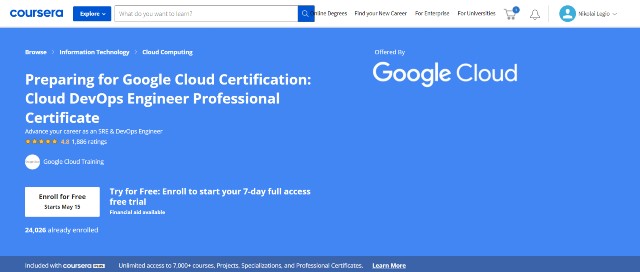
Course Content
This program consists of five minor courses as follows:
1. Google Cloud Fundamentals – Cloud Infrastructure – The first course will introduce you to crucial computing and storage services you need to work with on the Google Cloud Platform. Also, you will grasp the right tools to handle resource and policy management tasks.
2. Developing a Google SRE Culture – The second course will delve into Google Site Engineering philosophies. You will learn how to adapt them to improve the collaboration between business and IT.
3. Reliable Google Cloud Infrastructure: Design and Process – The third course will equip you with the skills to build reliable and efficient solutions on Google Cloud. You will learn about application architecture and microservice design.
Subsequently, you will build DevOps pipelines and deploy applications to Google Cloud.
4. Logging, Monitoring, and Observability in Google Cloud – The fourth course will guide you on how to monitor and troubleshoot to improve and ensure the stability of the infrastructure and the application. All of these are skills that DevOps professionals have to master.
5. Getting Started with Google Kubernetes Engine – The final course will drill deep into creating and storing a container. Later, you will learn about Google Kubernetes Engine (GKE) and use it to deploy a Kubernetes cluster.
Each course is equipped with additional educational resources, including case studies, hands-on labs, design activities, etc. All of these would be extremely useful in enriching your learning experience.
According to Google, you should spend 5 hours per week on the course, and you will complete it in 3 months.
Free auditing is also available. However, getting the full experience may prove a superior option, as you can work on labs and assignments. Subscribing to the program costs $49 per month.
Pros & Cons
Pros
- Taught by Google cloud experts
- Well-structured curriculum covering all crucial concepts and best practices
- Packed with tons of educational resources
- Free auditing
Cons
- Some students believed that the final course on the GKE was superficial.
- There are several technical issues in the assignments.
Coursera Plus
Since I have featured multiple Coursera programs in this article, you may be interested in more than one of them. If that is the case, I suggest subscribing to Coursera Plus instead.
Starting at only $33.25 per month, Coursera Plus provides full access (not just auditing) to more than 95% of the content platform-wide. With this subscription, you do not need to pay $39-$79 (one-time or monthly) for each specialization again, saving hundreds of dollars in course fees.
Thus, Coursera Plus is a must-subscribe for diligent students who want to upskill to pursue a higher-paid career.
[sc name=”coursera” ][/sc]Other Alternatives
DevOps Foundations: Software Development Optimization – This program from Anahuac University goes through CI/CD and automation processes in software development. However, the course content is not very informative compared to those on the list.
IBM DevOps and Software Engineering Professional Certificate – This ambitious program from IBM aims to cover the essence of DevOps and software engineering. Unfortunately, I do not think the course is well-structured, plus many actual students complained that they have encountered technical.
Hence, I do not think I can give it a pass at the moment.
Related Courses
Site Reliability – Coming Soon
Kubernetes – Coming Soon
Agile Software Development – Coming Soon
AZ-400 DevOps Certification Training Course – Coming Soon